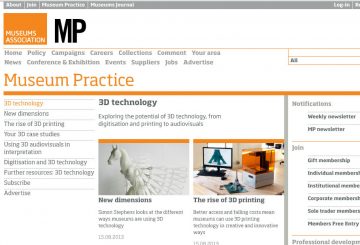Language: English
Title: CODE ¦ WORDS: Technology and theory in the museum
About: “An Experiment in Online Publishing and Discourse.
What is Project CODE│WORDS?
Project CODE | WORDS is an experimental discursive publishing project that gathers a diverse group of leading thinkers and practitioners to explore emerging issues concerning the nature of museums in light of the dramatic and ongoing impact of digital technologies on society.
Project CODE│WORDS is an effort to gather and harness the discourse occurring among the museum technology community, the quantity and quality of which have grown and matured tremendously over the past decade. Conversations online and at conferences regularly tackle challenging questions regarding the identity of museums, their roles in society, their responsibilities to serve a global public, and the nature of collecting, preservation, education, scholarship, primary research, and ethics in a digital age. While the influence of these ideas is widespread among the immediate community of practitioners, they are not always shared more broadly throughout the field, limiting their utility. In spite of this, those discussions are beginning to inspire change in many museums and are demonstrating the important relationship between emerging digital practices and museum theory. CODE│WORDS aims to explore ways to spread new ideas, and to engage the global community of museum professionals in exploring how we respond to challenges and opportunities digital technologies present.
You are invited to be a part of this experiment!
A core aim of Project CODE | WORDS is to utilise online publishing platforms and collaborative technologies to foster a broad conversation around emerging theories of digital museum practice. The focus of the Project will be a collection of essays, published on Medium, with the most interesting of these later developed for a print publication.
An initial list of expert authors was chosen to start the conversation and provide essays offering their perspectives. However, it is hoped that the dialogue will not end there, but rather, that diverse participants from across the museum sector will also choose to engage in this discussion, writing essays of their own, or developing the dialogue further in other ways. You are invited to share your expertise, your ideas, and your experiences with a global audience of interested peers.
Our topics
To start the discussion, we laid out some broad areas of interest:
Making the value statement for museums in a digital age — How can museums determine what’s important and not just what’s easy?
The politics of new technologies — How do we balance the shifting equations of power, audience, and authority?
Dialogue and discourse in museums — Who’s talking and who’s listening?
Creativity, innovation, and technology — Is there a relationship between the three that’s unique to museums?
Digital curation — What does it mean to collect and preserve digital media, art, and information?
Eschewing both technofetishism and technophobia. — New digital technologies won’t solve all the problems in the world, or museum, nor will they destroy everything we hold dear. Things will change, as they always do. How will we respond to those changes in a deliberate manner?
These ideas were conceived of not as constraints, but as starting places from which we could fan out and explore.
In the essays to come, we will venture forth, and invite you to join us. These complex issues require the collective creativity of all of us.
The plan
The goal of the project is to harness the power of a global community of interest to discuss and debate a series of issues concerning the museum sector’s responses to digital technologies, and the potential implications. A series of essays will appear here over the course of several weeks, tagged with the #CODEWORDS hashtag. A cohort of leading museum thinkers have volunteered to jump-start the project as essayists. However, the Project invites members of the broader museum community to extend the ideas proposed by these initial authors through written critique, and to contribute their own essays. These contributed writings will be compiled, together with the online commentary generated by the project to form the nucleus of a new digital and print publication.
What to expect
Project CODE | WORDS has three primary phases:
Phase I consisted of a series of face-to-face and online discussions with the initial project authors, to create a framework for the project and select topics for discussion.
Phase II is a focused writing project, in which authors will submit essays via the online platform, Medium. During an anticipated 6-week period, 12 authors will post essays on topics chosen in Phase I. The Project invites the public to discuss these essays across a variety of online channels using the hashtag #CODEWORDS with the purpose of expanding and refining the arguments presented by the authors, and to contribute essays of their own, on the broad themes of the identity of museums, their roles in society, their responsibilities to serve a global public, and the nature of collecting, preservation, education, scholarship, primary research, and ethics in a digital age.
This approach will allow the project to encourage both deep and thoughtful essays and considered public commentary, as well as responsiveness and the ability to adapt the ongoing discussion to new questions as they arise.
In Phase III, essayists will use the critical feedback from subsequent responses, commentary, and other essays to refine their arguments. All public submissions and commentary will be archived and released to the public whenever possible. Selected essays and responses will be drawn together to form the text of an edited print and digital volume suitable for distribution to a broad audience. All essays will be considered for the edited volume.
The project contributors invite open feedback on these ideas and the process as it evolves. The hope is that this open method might produce a new process for publishing that can leverage the best aspects of our community while producing a snapshot of the critical theory and digital practice of museums at this moment in time.
Join us!
The Project CODE | WORDS Team
Suse Cairns, The University of Newcastle, AUS @shineslike
Ed Rodley, Peabody Essex Museum, USA @erodley
Rob Stein, Dallas Museum of Art, USA @rjstein
Seb Chan, Cooper-Hewitt National Design Museum, USA @sebchan
Susan Chun, Museum of Contemporary Art Chicago, USA @schun
Michael Edson, Smithsonian Institution, USA @mpedson
Courtney Johnston, Dowse Art Museum, NZ @auchmill
Sarah Kenderdine, National Institute for Experimental Arts, COFA, UNSW, HK/AUS
Luis Marcelo Mendes, Museum Consultant, BR @lumamendes
Mike Murawski, Portland Art Museum, USA @murawski27
Nick Poole, Collections Trust, UK @nickpoole1
John Russick, Chicago History Museum, USA
Merete Sanderhoff, Statens Museum for Kunst, DK @msanderhoff
Koven Smith, Kinetic Museums, USA @5easypieces
Thomas Soderqvist, Medical Musieon, DK @museionist
Beck Tench, Museum of Life and Science, USA @10ch
Marthe de Vette, Van Gogh Museum, NL
Bruce Wyman, Museum Consultant, USA @bwyman
Project CODE | WORDS: The Origin Story
In early 2014, Suse Cairns, Ed Rodley, and Rob Stein began a conversation about whether it was possible to document these emerging ideas at the intersection of digital practice and museums in a way that would not sacrifice the discursive richness that is so integral to this community’s practice. While each had participated in various online and print publishing efforts in the past, those had always veered either solidly towards an informal online social discussion, or towards a formal, but static and selective document. Together, the three wondered what might be possible if a group of authors tackled a set of interrelated issues at the same time, in public, with an eye toward a more formal publication as the final product? The process itself would be an interesting experiment, and the outcome — meaningful discourse and new knowledge — could be a real benefit to the field. This idea evolved into Project CODE | WORDS.
Because this is an experiment, the final outcomes may be different from those anticipated at the start.”
Category: Cultural structure


